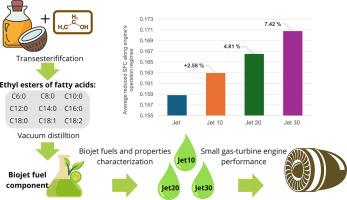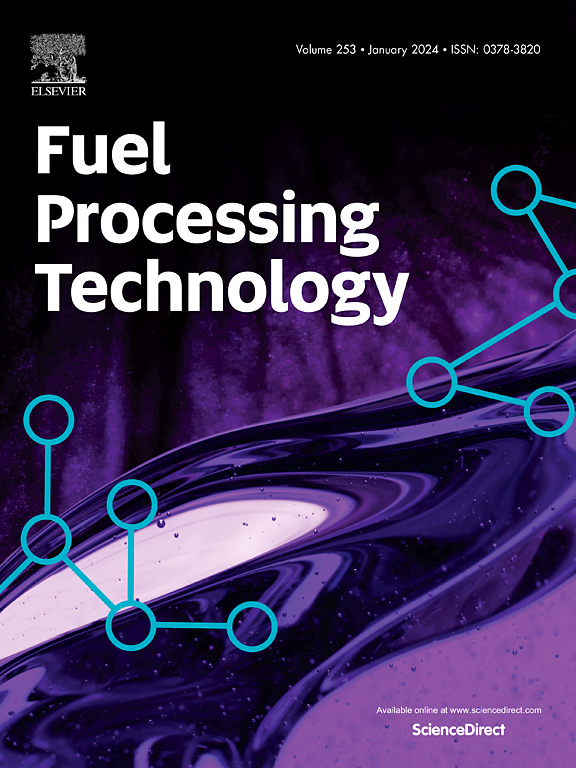椰子油基生物喷气燃料的开发与涡轮发动机试验
IF 7.7
2区 工程技术
Q1 CHEMISTRY, APPLIED
引用次数: 0
摘要
对可持续航空燃料的需求不断增加,以及航空业脱碳的需要,导致对可再生航空燃料的广泛研究正在进行。尽管取得了显著进展,但仍需要扩大原料范围,优化技术途径,并扩大新燃料的生产规模。为了应对这些挑战,作者建议开发新型生物喷气燃料。该工作包括对可再生燃料组分的合成、新型生物喷气燃料的基本物理化学性质的研究以及燃气涡轮发动机运行参数的评估,以验证该燃料可用于喷气发动机推进并具有所需效率的假设。以椰子油为原料,以乙醇为原料酯化制备椰子油乙酯(COEE)。原料和生产方法的选择使生产的产品具有高水平的COEE纯度(97.4%),轻分子量组成(C6-C18)接近常规喷气燃料,低含量的不饱和脂肪酸(低于5%)。对传统喷气燃料和10%、20%、30% COEE含量的生物喷气燃料的基本理化性质进行了研究,结果表明:密度提高1.01 ~ 2.53%,粘度提高9.79 ~ 32.26%,凝固点提高10.34 ~ 33.51%,燃烧热降低1.69 ~ 5.07%。小型燃气涡轮发动机使用常规燃料和生物喷气燃料的性能测试表明,发动机启动和运行总体稳定。虽然没有发现对运行参数的负面影响,但在所有运行状态下都观察到发动机的比油耗上升:生物喷气燃料分别增加了2.58%、4.81%和7.42%,COEE分别为10%、20%和30%。本文章由计算机程序翻译,如有差异,请以英文原文为准。

Development and turbine engine testing of coconut oil-based biojet fuel
The increasing demand for sustainable aviation fuels, along with the need to decarbonize the aviation sector, has led to ongoing extensive research into renewable jet fuels. Despite notable progress, there remains a need to expand the range of feedstocks, optimize technological pathways, and scale up new fuel production. The authors propose developing novel biojet fuel in response to these challenges. The work presents complex research on the synthesis of renewable fuel components, the study of basic physical-chemical properties of new biojet fuel, and the assessment of gas turbine engine operation parameters to validate the hypothesis that this fuel can be used for jet engine propulsion with the required efficiency. Coconut oil ethyl esters (COEE) used as a renewable component were synthesized via esterification of coconut oil with ethanol and refined via vacuum distillation. The choice of the feedstock and production method allowed the production of a product with a high level of purity (97.4 %) of COEE, a light molecular weight composition (C6-C18) close to conventional jet fuel, and a low content of unsaturated fatty acids (below 5 %). The study of basic physical-chemical properties of biojet fuels containing traditional jet fuel and 10 %, 20 %, and 30 % of COEE demonstrated the rise of density by 1.01–2.53 %, viscosity by 9.79–32.26 %, freezing point by 10.34–33.51 %, and reduction of combustion heat by 1.69–5.07 %. Performance tests of a small gas turbine engine with conventional and biojet fuels demonstrated an overall stable engine start-up and operation. While no negative impact on operating parameters was found, the rise of the engine's specific fuel consumption was observed at all operation regimes: by 2.58 % 4.81 %, and 7.42 % for biojet fuel with 10 %, 20 %, and 30 % of COEE, respectively.
求助全文
通过发布文献求助,成功后即可免费获取论文全文。
去求助
来源期刊

Fuel Processing Technology
工程技术-工程:化工
CiteScore
13.20
自引率
9.30%
发文量
398
审稿时长
26 days
期刊介绍:
Fuel Processing Technology (FPT) deals with the scientific and technological aspects of converting fossil and renewable resources to clean fuels, value-added chemicals, fuel-related advanced carbon materials and by-products. In addition to the traditional non-nuclear fossil fuels, biomass and wastes, papers on the integration of renewables such as solar and wind energy and energy storage into the fuel processing processes, as well as papers on the production and conversion of non-carbon-containing fuels such as hydrogen and ammonia, are also welcome. While chemical conversion is emphasized, papers on advanced physical conversion processes are also considered for publication in FPT. Papers on the fundamental aspects of fuel structure and properties will also be considered.
 求助内容:
求助内容: 应助结果提醒方式:
应助结果提醒方式:


